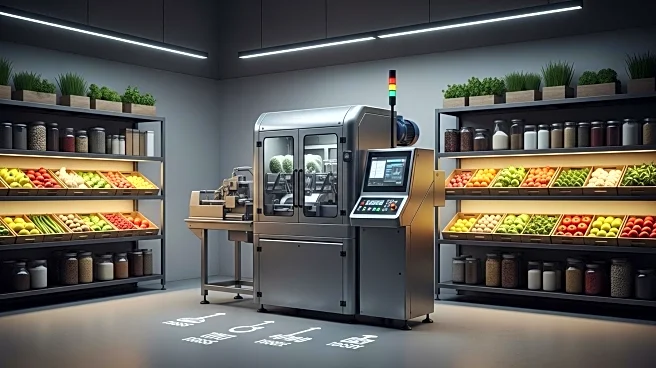What's Happening?
The UK food and drink industry, a major manufacturing sector, is grappling with rising costs, labour shortages, and supply chain challenges. Despite generating significant turnover and supporting millions of jobs, the sector has received less investment compared to automotive and aerospace industries. This has led to a productivity gap worth billions. Many manufacturers are now prioritizing automation and digital solutions to enhance efficiency and competitiveness. However, confidence remains low due to volatile global conditions and recent policy impacts. The industry faces pressures such as ingredient availability, labour constraints, operational costs, compliance, and demand volatility. These challenges are prompting manufacturers to adopt innovative technologies to transform pressure into competitive advantage.
Why It's Important?
The pressures faced by the UK food and drink industry have significant implications for its economic contribution and employment. As the largest manufacturing sector, its ability to adapt and innovate is crucial for maintaining its competitive edge and supporting the broader supply chain. The shift towards automation and digital solutions could lead to increased productivity, reduced waste, and new growth opportunities. However, the industry's cautious approach to investment highlights the need for strategic focus to navigate global uncertainties and policy changes. Successful adaptation could enhance the sector's resilience, ensuring it continues to meet consumer demands and contribute to the economy.
What's Next?
Manufacturers are expected to continue investing in automation and digital tools to address the challenges they face. This includes deploying real-time Overall Equipment Effectiveness platforms and automated guided vehicles to improve efficiency and reduce costs. The industry may also explore advanced simulation software to optimize factory layouts and production processes. As manufacturers adapt to these changes, they will need to balance innovation with compliance and consumer trends. The next wave of investment will likely focus on areas that offer the greatest potential for productivity gains and operational stability.
Beyond the Headlines
The transformation of the UK food and drink industry through technology and smarter processes could have long-term implications for sustainability and environmental impact. By optimizing production and reducing waste, manufacturers can contribute to more sustainable practices. Additionally, the adoption of digital solutions may lead to shifts in workforce dynamics, requiring new skills and training. The industry's ability to navigate these changes will be crucial for its future success and its role in the broader economy.










